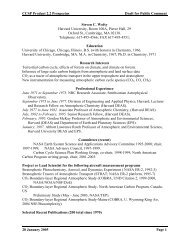Decision support experiments and evaluations using seasonal to ...
Decision support experiments and evaluations using seasonal to ...
Decision support experiments and evaluations using seasonal to ...
Create successful ePaper yourself
Turn your PDF publications into a flip-book with our unique Google optimized e-Paper software.
The U.S. Climate Change Science Program<br />
140<br />
approach discussed earlier—about the impacts<br />
of such social movements.<br />
While uncertainty is an inevitable fac<strong>to</strong>r in<br />
regards <strong>to</strong> climate variability <strong>and</strong> weather information,<br />
the communication of uncertainty—as<br />
our discussion has shown—can be significantly<br />
improved. Better underst<strong>and</strong>ing of innovative<br />
ways <strong>to</strong> communicate uncertainty <strong>to</strong> users<br />
should draw on additional literatures from<br />
the engineering, behavioral <strong>and</strong> social, <strong>and</strong><br />
natural science communities (e.g., NRC 2005;<br />
NRC 2006). Research efforts are needed by<br />
various professional communities involved in<br />
the generation <strong>and</strong> dissemination of climate information<br />
<strong>to</strong> better establish how <strong>to</strong> define <strong>and</strong><br />
communicate climate variability risks clearly<br />
<strong>and</strong> coherently <strong>and</strong> in ways that are meaningful<br />
<strong>to</strong> water managers. Additional research is<br />
needed <strong>to</strong> determine the most effective communication,<br />
dissemination <strong>and</strong> evaluation <strong>to</strong>ols<br />
<strong>to</strong> deliver information on potential impacts of<br />
climate variability, especially with regards <strong>to</strong><br />
such fac<strong>to</strong>rs as further reducing uncertainties<br />
associated with future sea-level rise, more reliable<br />
predictions of changes in frequency <strong>and</strong> intensity<br />
of tropical <strong>and</strong> extra-tropical s<strong>to</strong>rms, <strong>and</strong><br />
how saltwater intrusion will impact freshwater<br />
resources, <strong>and</strong> the frequency of drought. Much<br />
can be learned from the growing experience of<br />
RISAs <strong>and</strong> other decision-<strong>support</strong> partnerships<br />
<strong>and</strong> networks.<br />
Research on lessons from other resource management<br />
sec<strong>to</strong>rs on decision-<strong>support</strong> use <strong>and</strong><br />
decision maker/researcher collaboration would<br />
be useful. While water issues are ubiqui<strong>to</strong>us <strong>and</strong><br />
connect <strong>to</strong> many other resource areas, a great<br />
deal of research has been done on the impediments<br />
<strong>to</strong>, <strong>and</strong> opportunities for, collaboration<br />
in other resource areas such as energy, forests,<br />
coastal zone <strong>and</strong> hydropower. This research<br />
suggests that there is much that water managers<br />
<strong>and</strong> those who generate SI information on<br />
climate variability could learn from this literature.<br />
Among the questions that need further<br />
investigation are issues surrounding the following<br />
subject areas: (1) innovation (Are there<br />
resource areas in which <strong>to</strong>ol development <strong>and</strong><br />
use is proceeding at a faster pace than in water<br />
management?); (2) organizational culture <strong>and</strong><br />
leadership (Are some organizations <strong>and</strong> agencies<br />
more resistant <strong>to</strong> change, more hierarchical<br />
in their decision making, more formalized in<br />
their decisional pro<strong>to</strong>cols than is the case in<br />
water management?); <strong>and</strong> (3) collaborative style<br />
(Are some organizations in certain resource<br />
areas or science endeavors better at collaborating<br />
with stakeholder groups in the generation<br />
of information <strong>to</strong>ols, or other activities? [e.g.,<br />
Kaufman, 1967; Bromberg, 2000]). Much can<br />
also be learned about public expectations <strong>and</strong><br />
the expectations of user groups from their collaborations<br />
with such agencies that could be<br />
valuable <strong>to</strong> the water sec<strong>to</strong>r.<br />
Chapter 4




